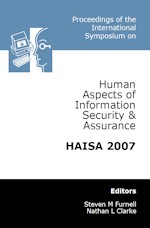In 2014, we launched our open-access repository which offers full text access to conference proceedings from many of our events including the INC and HAISA series. These papers are free to access and distribute (subject to citing the source).
» Openaccess proceedings » International Conference on Human Aspects of Information Security & Assurance (HAISA 2007)
 | International Conference on Human Aspects of Information Security & Assurance (HAISA 2007) |
Title: Using Digital Systems for Deception and Influence
Author(s): William Hutchinson
Reference: pp79-86
Keywords: Propaganda, Influence campaigns, Persuasion, Mobile technologies, Web design, Deception.
Abstract: This paper examines both the present and future uses of digital technologies to deceive and influence. Its scope is the deliberate design of processes to change the behaviour of the user by deceptive and influence techniques. The paper covers the conventional design of Web page content in the process of influence campaigns by governments, businesses, pressure groups and terrorist groups to promote their causes. It progresses to more speculative uses of deceptive methods ‘newer’ mobile and ubiquitous technologies. These technologies have the potential for both generic and individual targeting of those to be influenced. Their techniques used and success will depend on both the time span available which would determine whether the objective is to coerce, manipulate or convert the target(s) and what stage the persuasive process is at. The analysis proceeds from the concept of ‘captology’ and speculates how persuasion, influence and behavioural change can be achieved via such technologies as text messaging (or, Short Messaging Service – SMS).
Download count: 894
How to get this paper:


PDF copy of this paper is free to download. You may distribute this copy providing you cite this page as the source.
